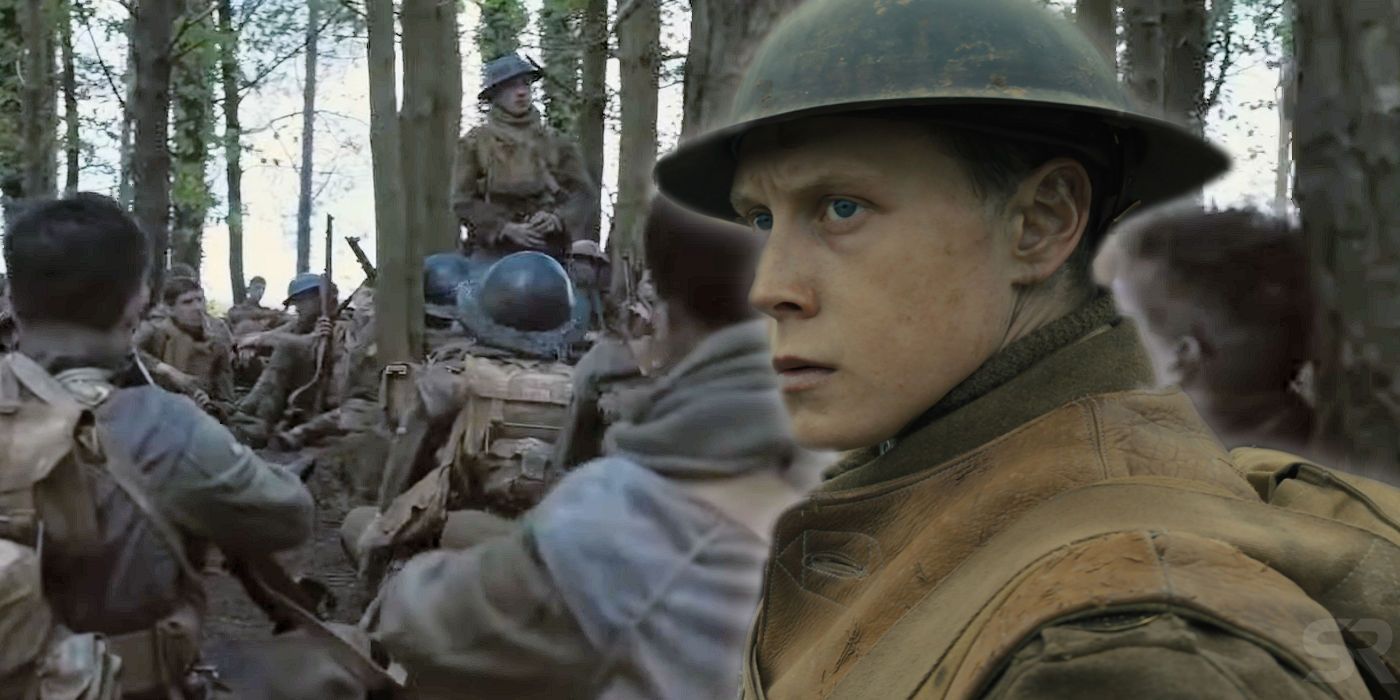1917 Song: What The Soldier Sings In The Woods
Summary Jos Slovick performed the folk song in 1917, but it isn't included in the film's soundtrack.
"The Wayfaring Stranger" symbolizes the soldiers' struggles in the film and adds to the nationalistic narrative of World War I.
Fans petitioned for an official version of the song featuring Jos Slovick.
The climax of 1917, the World War I epic directed and co-written by Sam Mendes, features a heart-wrenching scene in the woods when a soldier from the last wave of the Second Battalion of the Devonshire Regiment sings a folk song to his fellow soldiers. While the tune can be heard briefly within the official trailer for 1917 and within this single scene in the woods, the folk song isn't featured on the film's soundtrack. Consequently, its mystery has generated some interest in the music itself and the artist who performs it.
1917 is available to rent or buy on Amazon Prime Video.
1917 stars George MacKay as Lance Corporal William Schofield and Dean-Charles Chapman as Lance Corporal Tom Blake as they embark on a dangerous mission to deliver a message to Colonel Mackenzie (Benedict Cumberbatch) of the Second Battalion of the Devonshire Regiment. The scene featuring the aforementioned song takes place towards the 2019 war movie's end when Schofield washes up on a riverbank. Schofield hears someone singing in the distance and follows the melody to a group of English soldiers sitting in the forest, listening to their comrade singing the American folk song, "The Wayfaring Stranger."
Jos Slovick Sings "The Wayfaring Stranger" In The Woods In 1917
The Song Isn't Included On 1917's Soundtrack
Close
The folk song featured in 1917 was performed by the actor and singer Jos Slovick, whose credit reads, "Wayfaring Stranger Soldier." Despite the fact that Slovick's performance of "The Wayfaring Stranger" gave 1917 its most emotionally complex scene, no studio version of Slovick's rendition of the folk song was ever produced for the 1917 soundtrack. The collection of music from 1917 is mainly comprised of Thomas Newman's score, which was nominated for an Oscar in 2020 under the Best Original Score category.
"The Wayfaring Stranger" establishes a beautiful moment in 1917, but it only adds to the film's nationalistic rhetoric when placed in conjunction with the historical context of WWI.
After Slovick's rendition of "The Wayfaring Stranger" debuted in 1917, the song became in high demand by fans of the war epic. While no studio version was produced for 1917's soundtrack, fans started a petition on Change.org for the director Sam Mendes to record an official version of the song with Jos Slovick as the artist. Consequently, Sony Classical Records released an EP featuring three versions of "The Wayfaring Stranger" performed by Slovick.
Related Oscars 2020: Why 1917 Beat Avengers: Endgame For Best Visual Effects Marvel might've hoped to taste some Oscars 2020 success by taking home Best Visual Effects, but 1917 won the gong. Here's why Thanos lost (again).
What The Soldier's Song Really Means In 1917
"The Wayfaring Stranger" Holds Great Meaning In The Film
While the song most likely originated almost a century before the events of 1917, the content of "The Wayfaring Stranger" is very befitting of a World War I soldier's journey, especially since the mournful lyrics ruminate over the peace and comfort that could be found within death. The tune appears towards 1917's ending after Schofield witnesses the death of his friend Blake. So, "The Wayfaring Stranger" is relevant for Schofield and the last wave of soldiers sitting and listening to the song for whom the possibility of death is real as they wait to be sent into battle.
"The Wayfaring Stranger" establishes a beautiful moment in 1917, but it only adds to the film's nationalistic rhetoric when placed in conjunction with the historical context of WWI. While the lyrics may vary depending on the rendition, the version featured within 1917 glorifies the life and death of the common everyman, who, after struggling on a "rough and steep" journey, will be welcomed home to golden fields "where gods redeemed shall ever sleep." The concept of comparing a courageous soldier like Schofield in 1917 to a god matches the nationalism prevalent during WWI by glorifying the soldier's journey.











COMMENTS